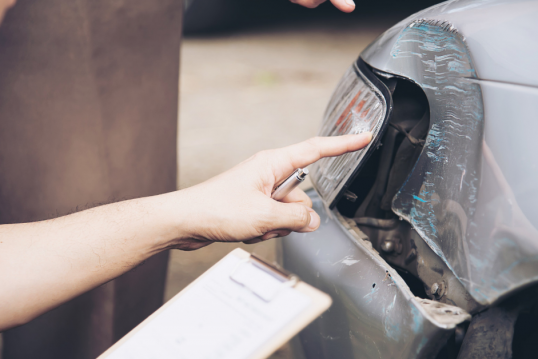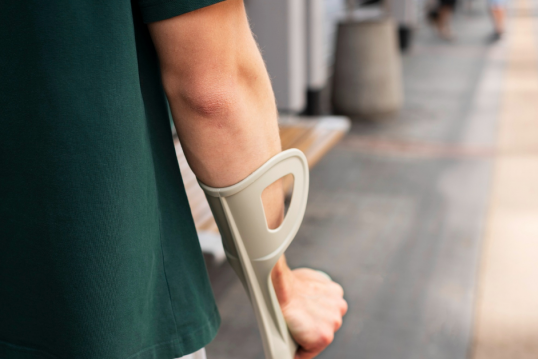A personal injury can change your life in an instant. If you’ve been injured in a car accident, slip-and-fall, or another type of accident in Henderson, you may be facing mounting medical bills, lost income, and ongoing pain.
Fortunately, victims of accidents caused by negligence can seek financial compensation for these and other damages by filing a personal injury claim. However, knowing how to get the most out of your claim and receive compensation that fairly accounts for the damages you’ve suffered is important.
Many injury victims accept the first settlement offer from an insurance company, not realizing they may be entitled to far more compensation. Others unknowingly make mistakes that undermine their case. But if you understand your legal rights and take the proper steps early on, you can increase your chances of receiving fair compensation.
At the Cottle Firm, our Henderson personal injury lawyers take pride in helping our clients fight for the full compensation they deserve. Contact us today at 702-722-6111 to discuss your personal injury case in a free consultation.
Your Rights in a Personal Injury Case
If you’ve been injured in an accident in Henderson, knowing your legal rights is the first step toward seeking the compensation you deserve. Nevada law allows injury victims to pursue financial compensation for medical bills, lost wages, pain and suffering, and other damages. However, if you want to maximize your claim, you should know how certain state laws may apply to your case and how the claims process works.
Nevada’s Comparative Negligence Rule
Nevada’s comparative negligence law (NRS 41.141) is one of the most relevant statutes for personal injury claims in Henderson.
According to this rule, both the plaintiff and defendant are evaluated for fault and each is assigned a percentage of fault. You can still seek compensation if you are partially liable, provided that your percentage of fault is no more than 50%. However, any compensation you receive will be reduced by this percentage of fault.
For example, if you are awarded $100,000 in damages but are found 20% at fault, your final compensation will be reduced to $80,000. However, if you are more than 50% at fault, you cannot recover any damages at all.
This means that in order to maximize your compensation, it’s important to present strong evidence that minimizes your percentage of fault.
The Statute of Limitations: How Long Do You Have to File?
Nevada law imposes a strict statute of limitations for filing personal injury claims. In most cases, you have two years from the date of injury to file a lawsuit against the responsible party. However, there are certain exceptions. For example, if you discover a delayed injury, the two-year clock would begin from the date of discovery, rather than the date of the accident. Additionally, medical malpractice claims have a three-year statute of limitations.
Settlements vs. Lawsuits
Most personal injury cases are resolved with settlements, rather than going to court. However, that doesn’t mean that you should accept the first settlement offer from an insurance company. Settlements are faster and less stressful than trials, but insurance companies often undervalue your claim.
An experienced Henderson personal injury attorney can negotiate with insurance companies on your behalf for a fair settlement. Typically, going to court only becomes necessary if the insurance company refuses to offer a fair settlement, if liability is more complicated, or if your damages are severe and require long-term compensation.
Immediate Steps to Take After an Injury
The actions you take in the moments, days, and weeks after your injury can significantly affect your personal injury claim. Insurance companies look for any reason to deny or reduce your compensation, so taking the right steps early on can help strengthen your case. Here are some of the most important actions to take after an injury in Henderson.
Seek Medical Attention Immediately
Your health should always be the top priority. Even if your injuries seem minor, you should seek medical care right away. Some injuries take time to appear, such as concussions or internal injuries. Additionally, delaying treatment gives insurance companies an excuse to argue that your injuries weren’t serious.
Make sure to call 911 or visit a doctor as soon as possible, follow all medical advice and complete any recommended treatments, and keep copies of all medical records and bills for your case.
Report the Incident
You should document your injury with the appropriate authorities, which could vary depending on where and how you were injured.
For example, if you were injured in a car accident, you would need to call the police. If you were injured in a slip-and-fall, you would need to file an accident report with the property owner or a manager. If you suffered a work injury, you would need to notify your employer.
Official reports help establish what happened and provide key details that may support your personal injury claim.
Gather Evidence at the Scene
If possible, collect as much evidence as you can from the accident scene. This may include:
- Taking photos of your injuries, property damage, and the surrounding environment.
- Getting contact information from any witnesses.
- Noting environmental factors, such as weather conditions, slippery floors, or missing safety signs.
The more evidence you gather from the scene, the more difficult it is for insurance companies to dispute your claim later.
Avoid Admitting Fault or Making Statements to Insurers
Anything you say to insurance representatives after an accident can be used against you. Even a statement like “I didn’t see the other car” could be twisted to imply you were at fault. This is why it’s best to avoid speaking with insurance reps until you first speak to a personal injury lawyer.
Follow these key rules to avoid jeopardizing your claim:
- Do not admit fault – Nevada follows comparative negligence laws, and admitting fault can reduce your compensation.
- Avoid making recorded statements – Insurance companies may request recorded statements, but you should not comply until you’ve consulted with a personal injury lawyer.
- Do not discuss your injuries in detail until you’ve seen a doctor.
Insurance adjusters are trained to ask tricky questions that could hurt your claim. Always consult an attorney before giving any statements.
Keep Detailed Records of Expenses and Lost Wages
You will need to provide documentation to recover damages for lost income and other financial losses. The following forms of documentation are key pieces of evidence in personal injury claims:
- Pay stubs and employer verification if you missed work due to your injury.
- Medical records and transportation costs for doctor’s appointments.
- Receipts for home care or assistive devices you had to purchase due to your injury.
The more documentation you have, the stronger your claim for financial compensation.
Contact a Personal Injury Lawyer Early
While you are not legally required to hire a lawyer, doing so may improve your chances of getting the compensation you deserve. An experienced attorney can:
- Handle negotiations with insurance companies to prevent lowball settlements.
- Gather and present strong evidence to support your case.
- Ensure you meet deadlines (such as Nevada’s two-year statute of limitations).
Consulting a lawyer early can help you avoid costly mistakes that could harm your case.
Checklist for Gathering Evidence
Strong evidence is the foundation of a successful personal injury claim. The more documentation you have to support your case, the harder it is for insurance companies or opposing lawyers to dispute your claim. Below is a comprehensive checklist of the evidence you should gather.
Medical Records
Medical records provide clear documentation of the extent of your injuries, the treatment you’ve received, and your long-term prognosis. Be sure to collect the following:
- Emergency room reports if you were treated immediately after the accident.
- Doctor’s notes and diagnoses detailing the severity of your condition.
- X-rays, MRIs, and other scans proving internal injuries.
- Prescription records showing necessary medications and pain management treatments.
- Physical therapy or rehabilitation records if your injuries require ongoing care.
Insurance companies may try to argue that your injuries are less severe than you claim, so having complete medical documentation helps counter their arguments.
Photos and Videos
In some cases, visual evidence can help prove what happened. If possible, take clear, high-quality photos and videos of:
- Your injuries (cuts, bruises, swelling, burns, etc.).
- The accident scene (skid marks, hazardous conditions, broken equipment, etc.).
- Property damage (vehicle damage, broken stairs, unsafe work conditions).
- Any warning signs of a lack thereof (missing “Wet Floor” signs, faulty handrails, etc.)
Witness Statements
Eyewitness accounts provide an unbiased perspective on what happened. A strong third-party statement can corroborate your version of events.
To collect strong witness statements:
- Get full names and contact information of anyone who saw the accident.
- Ask them to provide a written statement or record their verbal account if they agree.
- Ensure they note important details, such as weather conditions, who was involved, and how the accident occurred.
Witnesses who are not related to you tend to be more credible in the eyes of insurance companies and courts.
Police and Accident Reports
If law enforcement responded to your accident, always request a copy of the police report. These reports often contain key details, such as:
- The officer’s objective account of what happened.
- Citations or violations issued to any party involved.
- Diagrams or descriptions of how the accident occurred.
- Statements from both parties and witnesses.
For workplace injuries or incidents on commercial properties, you may also need an accident report filed with your employer or the business owner.
Personal Injury Journal
Pain and suffering damages are also available in personal injury claims, but these are more subjective than medical bills. Keeping a personal injury journal can help show the pain and suffering you’ve endured as a result of your injury.
Your journal should include:
- Daily pain levels and how they fluctuate
- Activities you can no longer perform due to your injury
- Emotional distress (anxiety, depression, PTSD, etc.)
- Sleep disruptions, medication side effects, and other health struggles.
Working With a Personal Injury Attorney
Hiring an experienced Henderson personal injury attorney can help improve your chances of securing the financial compensation you deserve. Many victims who try to handle claims on their own end up accepting lowball settlements from insurance companies or making mistakes that weaken their case. A skilled lawyer knows how to gather evidence, negotiate effectively, and fight for the full value of your damages.
Personal injury attorneys have the experience and legal knowledge to maximize settlements in ways that unrepresented victims often cannot. They understand the tactics used by insurance companies and can counter them effectively.
What to Look for in a Lawyer
Selecting the right attorney can potentially be the difference in your case. Consider the following factors when hiring a personal injury attorney in Henderson:
Experience Handling Similar Cases in Henderson
Choose an attorney with a proven track record in handling personal injury cases similar to yours within the Henderson area. Local experience ensures familiarity with regional laws and court systems.
Track Record of Success
Investigate the attorney’s history to determine if they have previously secured favorable settlements in similar cases. A strong track record suggests that they are capable of handling your case successfully.
Fee Structures and Contingency Agreements
Most personal injury lawyers operate on a contingency fee basis, meaning they only get paid if you win your case. Make sure you understand the percentage they will take and any additional costs that may arise.
Avoiding Common Mistakes That Can Reduce Your Compensation
Even strong cases can be weakened by avoidable mistakes, such as:
- Delaying medical care – Insurance companies may argue that delayed treatment suggests your injuries are not serious.
- Posting on social media – Comments you make on your social media accounts could be twisted by insurers to question the severity of your injuries or related damages.
- Accepting quick settlements – An insurance company’s first settlement is typically much lower than what the case is worth. Review any settlement offers with your lawyer.
Learn More From a Henderson Personal Injury Lawyer
Were you injured in a car accident, slip-and-fall, or another accident caused by someone else’s negligence? You have legal rights, including the right to pursue financial compensation in a personal injury claim. The experienced Henderson personal injury lawyers at the Cottle Firm are prepared to help you fight for every penny you deserve: call us today at 702-722-6111 to discuss your case in a free consultation.
Related:
Choosing Between a Las Vegas or Henderson Personal Injury Lawyer: Key Considerations









